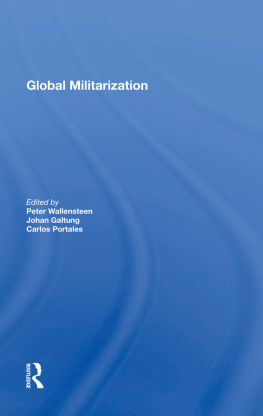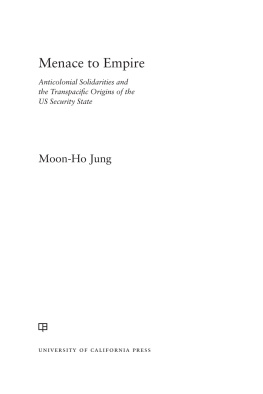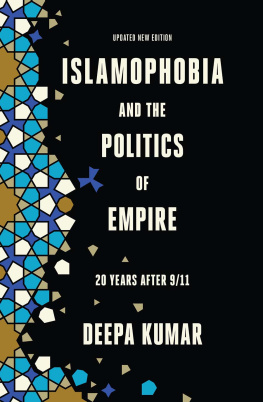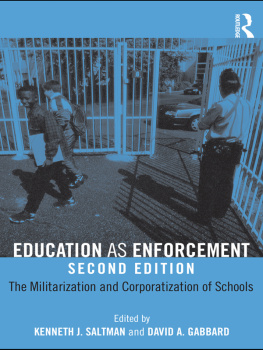Faith in the Face of Militarization
Indigenous, Feminist, and Interreligious Voices
edited by
Jude Lal Fernando
foreword by Collin Isaiah Cowan
preface by Sudipta Singh

FAITH IN THE FACE OF MILITARIZATION
Indigenous, Feminist, and Interreligious Voices
Copyright 2021 Jude Lal Fernando. All rights reserved. Except for brief quotations in critical publications or reviews, no part of this book may be reproduced in any manner without prior written permission from the publisher. Write: Permissions, Wipf and Stock Publishers, W. th Ave., Suite , Eugene, OR 97401 .
Pickwick Publications
An Imprint of Wipf and Stock Publishers
W. th Ave., Suite
Eugene, OR 97401
www.wipfandstock.com
paperback isbn: 978-1-7252-8399-2
hardcover isbn: 978-1-7252-8398-5
ebook isbn: 978-1-7252-8400-5
Cataloguing-in-Publication data:
Names: Fernando, Jude Lal, editor. | Cowan, Colin, foreword. | Singh, Sudipta, preface.
Title: Faith in the face of militarization : indigenous, feminist, and interreligious voices / edited by Jude Lal Fernando; foreword by Colin Cowan; preface by Sudipta Singh.
Description: Eugene, OR: Pickwick Publications, 2021 | Includes bibliographical references and index.
Identifiers: isbn 978-1-7252-8399-2 ( paperback ) | isbn 978-1-7252-8398-5 ( hardcover ) | isbn 978-1-7252-8400-5 ( ebook )
Subjects: LCSH: MilitarizationReligious aspects. | Indigenous peoples. | ImperialismReligious aspects. | Women and war.
Classification: BT736.2 F35 2021 ( print ) | BT736.2 ( ebook )
Foreword
M ilitarization works on the premise that a country should maintain a strong military capability and be prepared to use it to defend or promote national interests and maintain peace. The reality is that this makes the world less, not more secure. Those who live in contexts of war and militarization constantly challenge such myths of security, protection of national interests, and peace as promised by the powers that be. Their existential reality of death, destruction, and displacement (hell on earth) tell a different story. Empire, by divinizing itself as all-powerful, promises peace while in a permanent state of war, bent on crushing and desecrating life. The agents of Empire, those keen on militarizing society with the myths of security and peace, want us to believe that they have our well-being and the common good at heart.
The Council for World Mission (CWM) stands in the Christian prophetic tradition that advocates and hopes for a different kind of peace and security: that which works for and embodies the sacredness of all life and Gods promise, in and through Christ, of flourishing life for all. While the peace offered by the occupying Roman Imperium privileged the royals and was achieved through the socio-economic, political, and military oppression of the masses, Gods desire as embodied by Jesus pointed to a radically different kind of peace. It is a counter-imperial one where the poor are fed, the lame walk, the deaf hear, debts cancelled, prisoners are freed and there is a re-ordering of relationships. The gospel accounts on the life and ministry of this Galilean Jew is a trenchant theological critique of the demonic reach of Roman military occupation, of a people with overwhelming military-style force, of co-opted collaboration, and of the disfiguring of peoples humanity. That reach is there in the slaughter of babies and the crucifixion of an innocent Jesus. It could not, however, kill Gods desire of flourishing life for all. In the spirit of the One who rises-up, CWM seeks to partner with all committed to chanting down the military might of Babylon and chanting up a radically different kind of peace.
This volume is a timely intervention and contribution. And, I am delighted that CWM could have facilitated both opportunity and space at two conferences (Mexico City and Seoul), in our commitment to continually discern together ways to decolonize mission and theology in response to the cries and hopes of the peoples who resist war and militarization.
The contributors of this volume come from some of the most highly militarized lands in the world. Their reflections witness to faith that hopes for liberation in the face of the harsh realities and consequences of war. Their essays have emerged out of their prophetic denunciation of imperial peace that results in death, destruction and displacement, while proclaiming just peace that guarantees fullness of life. The work offers a sharp critique of theologies of whatever brand that justifies imperial peace based on military power. The indigenous, feminist, interreligious, Black and Dalit voices of this book demand our discipline and dedication to an alternative consciousness and commitment to transformative praxis. Above all, they call us to overcome isolation from each other in our particular struggles; and to form horizontal and intersecting solidarity across the borders amongst diverse oppressed peoples ,believing that the arc of justice is on our side in history, however grim the reality seems to be.
For me, the contributors in this volume affirm the prophetic calling that Jesus places on our lives to be agitators of a new epistemology, rooted in an understanding of Gods love for the world, a love that is relentless in making all things new. There is evil, despair and injustice in our world, but this work and CWMs witness is all about defying this reality with hope, hope which is audacious and daring like these texts. Through this publication we mark our solidarity with the diverse peoples and their numerous social and political movements who have been tormented by war and militarization, but continue to hope, believing that not only another world is possible: indeed, another world is also necessary.
Collin Isaiah Cowan
General Secretary, CWM
July, 2020
Rev Dr Collin Isaiah Cowan is the General Secretary of the Council for World Mission. He is originallly from Jamaica and was the General Secretary of the United Church in Jamaica and the Cayman Islands. Known for his courage, passion and commitment to justice, peace, integrity of creation, and building of life affirming communities, he has inspired many socially engaged groups and communities across the globe through his preaching and writing. He challenges the churches to move away from Christian triumphalism assoiciated with empire and promotes a new understanding of Christian witness and praxis that speaks Truth to the power and empower the powerless. His contribution towards developing capacities of churches to resist all imperial forces is immense.
Preface
T he Empires manipulation of geographical borders belies the violence at the heart of its methods of conquest and control. In order for its neocolonialism to be sustained, the Empire uses its brutal military machine, both overtly and covertly. Meanwhile co-opted ethno-religious allies propagate exclusivist nationalist ideologies and foment persecution of those who resist. In neocolonial contexts, militarization by the Empire and the militarism of ethno-religious states have an umbilical relationship.
The Empire utilizes conventional weapons, ranging from precision-guided munitions to small arms and light weapons around the world to destroy, kill, and maim. High-tech weaponry such as nuclear weapons are used as a tool to manipulate international relations and geopolitical power structures. Many emerging weapon technologies such as drones, robots, and space weapons are meant to further maximize destruction of our planet and resisting peoples.
There are direct correlations between enormous resources spent on war and weapons on the one hand and global social and economic inequalities and poverty on the other. War destroys lives, livelihoods, infrastructure, and well-being creating a culture of fear and violence. This impedes development by upsetting social programs, education, transportation, business, and tourism, which in turn prevents economic stability, social and mental well-being, and sustainable livelihoods. The manufacture and use of weapons also undermine sustainable ecological development and preservation creating inequality in access to resources which further impedes poverty-reduction initiatives. In the search for alternatives to militarized security, it is necessary to problematize justification of war and military expenditure while fully recognizing the need to uphold human rights obligations, including socio-economic rights. These issues cannot be addressed in isolation from one another.The COVID- pandemic has exposed, more than ever before, the brutal interconnection between the war paradigm and social inequalities that had been concealed by imperial peace and security.









